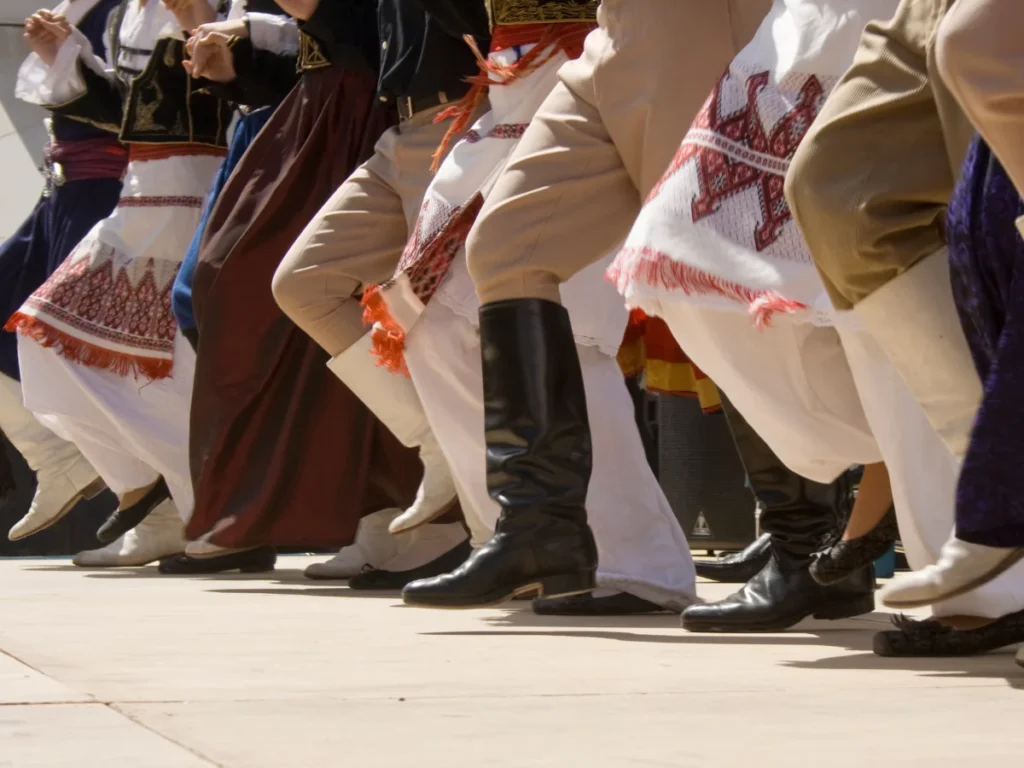Greek culture has a rich and diverse tradition of dance
Greek culture has a rich and diverse tradition of dance, and several iconic dances have captured the hearts of people worldwide. From the lively and celebratory Greek folk dances like the Kalamatianos and Tsamiko to the expressive and emotive movements of Greek contemporary dance, it’s a testament to the country’s rich artistic heritage. These dances often reflect the history, stories, and spirit of the Greek people, and experiencing them is a captivating window into Greek culture.

Greek culture has a rich and diverse tradition of dance
Iconic dances in Greece:
Zeibekiko: The Dance of Courage
Zeibekiko, often referred to as the “dance of the solo dancer,” is a captivating and expressive Greek dance. It originated from the zeibeks, a group of Anatolian warriors known for their bravery. This dance is characterized by its slow and dramatic movements, allowing the dancer to convey deep emotions and tell a story through their performance. Dancers often hold a handkerchief or napkin, adding a touch of flair to their movements. The zeibekiko is a dance of introspection, courage, and personal expression.
Syrtaki: The Dance of Joy and Unity
Syrtaki is a lively and joyful Greek dance that gained international fame through the film “Zorba the Greek.” This dance combines elements of the faster hasapiko and the slower kalamatiano, creating a dynamic and celebratory rhythm. Dancers join hands in a circle, moving in a lively and synchronized manner. The syrtaki embodies the spirit of communal celebration and unity, making it a popular choice at Greek weddings and festivities.
Sirtaki: A Modern Greek Fusion
Sirtaki is a dance that emerged in the 1960s as a fusion of the syrtaki and other Greek folk dances. It gained widespread popularity due to its inclusion in the aforementioned film, “Zorba the Greek.” In this dance, participants begin with slow, syrtaki-like steps and gradually transition into a faster, more energetic rhythm. The sirtaki captures the essence of Greece’s zest for life, offering a combination of tradition and modernity in its choreography.
Significance and Cultural Heritage
These iconic Greek dances hold significant cultural and emotional value for both Greeks and enthusiasts around the world. They serve as a reflection of Greece’s history, spirit, and diversity. The zeibekiko symbolizes courage and introspection, the syrtaki represents joy and unity, and the sirtaki bridges tradition and modernity. Whether performed in traditional settings or at festive occasions, these dances continue to connect people to Greece’s rich cultural heritage.
In conclusion, the zeibekiko, syrtaki, and sirtaki are emblematic of Greek dance traditions, each offering a unique blend of emotions and stories. These dances capture the essence of Greece’s cultural diversity and have become iconic symbols of the country’s rich heritage. Whether performed in Greece or abroad, these dances resonate with people as a celebration of life, unity, and personal expression.
